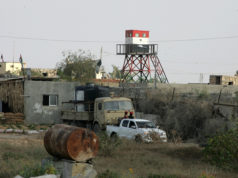In a display of widespread public dissatisfaction with Egyptian President Mohamed Morsi, the nation’s first elected leader, opposition groups plan to hold anti-government protests on June 30, the one-year anniversary of Morsi’s inauguration. With increasing demands for his ouster following economic difficulties and executive overreach, government officials have been preparing extensive security measures in the weeks leading up to the potentially volatile demonstrations.
Egypt’s Interior Minister Mohamed Ibrahim announced last week that tunnels and ferries on the Suez Canal would be shut down, blocking jihadists from capitalizing on the protests, effectively sealing off the Sinai Peninsula from the rest of Egypt. Furthermore, clan chiefs in Sinai have joined together to ensure the protection of public property. The dramatically increased security is intended to avert a repeat of the chaos during the 2011 protests that forced the resignation of President Hosni Mubarak.

Supporters of Egypt’s Islamist President Mohammed Morsi fill a public square outside the Rabia el-Adawiya Mosque in Cairo, not far from the presidential palace, during a rally in Cairo, on June 28, 2013. (Photo: AP) |
While the police force has indicated its neutrality in the upcoming demonstrations, the army’s role remains unclear. Abel Fattah al-Sisi, Chairman of the Supreme Council of the Armed Forces of Egypt, said the army would not sit idly while the country devolves back into turmoil. The ambiguity of his comments is cause for concern for the Morsi government, which distrusts the power of the armed forces in a region notorious for military coups. The Associated Press says protesters hope the army could apply further pressure on Morsi.
The United States’ perceived position on the protests, however, has drawn considerable outcry from Morsi’s opponents. U.S. Ambassador to Egypt Anne Patterson said she is “deeply skeptical” of the “street action,” and that the election process remained the best solution to the country’s problems. The U.S. Embassy in Cairo has warned of potential violence stemming from the protests and will close to the public on June 30.
Morsi, meanwhile, attempted to extinguish the underlying apprehension of protesters by promising to step down in 2016 and “ensure power is handed over according to the constitution and the law” should the Egyptian people democratically elect a successor. Tensions nevertheless remain high as the international community waits to see if June 30 will bring renewed unrest.





